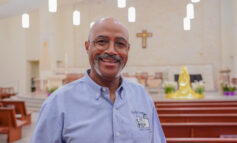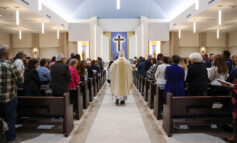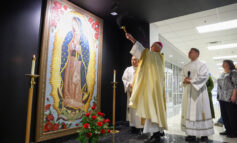
Father Elmer Herrera-Guzman, who serves as parochial vicar at Holy Cross Catholic Church in Oak Cliff, readies to enter Baylor Medical Center in Irving to celebrate the sacraments with a COVID-19 patient on Dec. 8. Father Herrera-Guzman is one of a team of young Diocese of Dallas priests ministering to COVID-19 patients during the pandemic as North Texas continues to see spiking numbers. (Michael Gresham/The Texas Catholic)
By Jeff Miller
Special to The Texas Catholic
Father Elmer Herrera-Guzman is a newcomer to the team of diocesan priests that since last spring has answered the precarious call to provide personal ministry to Catholics who have contracted the coronavirus. With only a few weeks’ experience at making visits to hospitals, nursing homes and residences, the parochial vicar at Holy Cross parish in Oak Cliff has already been greatly moved.
“One of the things is the fear in the people’s eyes because they don’t know what’s going to happen,” said Father Herrera-Guzman, 30, who was ordained in May. “That’s one of the things that really gets to you.”
The team of Diocese of Dallas priests, most under the age of 55, has been providing this special ministry since last spring. Deacon Charlie Stump’s duties in the diocesan office includes director of Catholic social ministry, and he serves as dispatcher for the group that currently numbers 16. When Deacon Stump receives word of a COVID patient in need, he sends out word through a messaging app. Once a priest has accepted, Deacon Stump confidentially provides the necessary information.
“We get calls in the middle of the night or in the middle of the day,” Deacon Stump said. The priests observe proper protective COVID protocols before, during and after each visit.
“They really come through in kind of a heroic way,” Auxiliary Bishop Greg Kelly said. “They have fulltime ministries of their own in various parishes and often are dropping what they’re doing or going as soon as they can.”
“Running toward it knowingly makes me more aware of the risk,” said Father Wade Bass, 32, a team member who is director and chaplain of Catholic Campus Ministry at SMU.
“There’s really not a good reason to keep people separated from the consolations of religion, especially if they’re dying. Also if they’re sick. I feel very strongly about that,” Father Bass added. “We’re made for communion with God and with neighbor. This important ministry allows us to really help people be who they are.”
The ministry has provided a reminder to some that Anointing of the Sick applies in situations in which the recipient isn’t necessarily near death.
“It can be received more than once,” Bishop Kelly said. “It’s not for anything light like a sore throat. It’s for serious bodily affliction or injury.”
Deacon Stump said, “There are stories that are true stories around patients that had COVID, that doctors have told the family to be prepared for death. And yet after Anointing of the Sick, it
gives the person individual strength to come back.”
Deacon Stump said attention has been paid to involvement in this ministry possibly creating extreme stress on the participating priests.
“It’s hard to drink from a dry well,” Deacon Stump said. “If they have a very difficult encounter with a COVID patient, they can go back to their rectory and have time to kind of decompress with their fellow priests or their spiritual director.
“It’s important that they continue to take care of themselves spiritually, so they’re not just going through the motions, but they’re truly recognizing how important it is for the individual that’s receiving the sacrament and also the family to know that God and the body of Christ is present there,” he added.
Most of the patients are intubated and unable to verbally respond. But at one nursing home in Collin County, an elderly female patient who was able to talk with Father Herrera-Guzman asked him, “Did you bring me the Lord?” He wasn’t prepared on that visit to provide the Eucharist. When he explained that, she began to weep.
“I felt like I’ve never seen a desire from anyone like that,” he said. “Part of it was her loneliness in the nursing home; her room was full of rosaries.”
So, Father Herrera-Guzman set out to satisfy that desire. He hurried to a nearby parish and explained his request, which required some verification to satisfy given the atypical circumstances (“Yes, I am a priest in Dallas.”). Father Herrera-Guzman returned with Holy Communion, much to the patient’s surprise and delight.
“From all the doom and bleakness, there are rays of shining hope of people’s desire for God,” he said.



